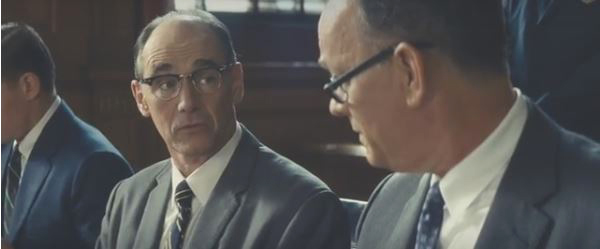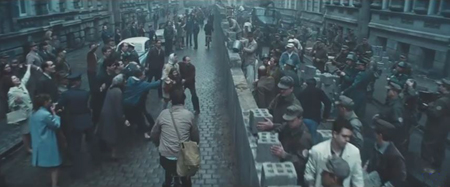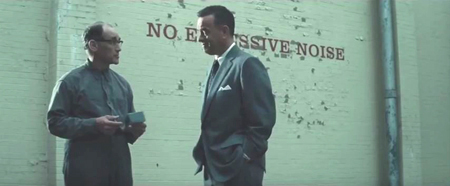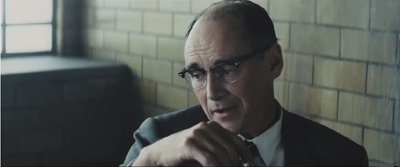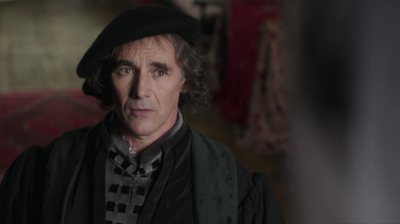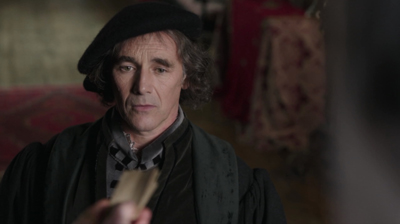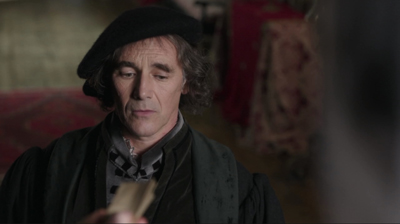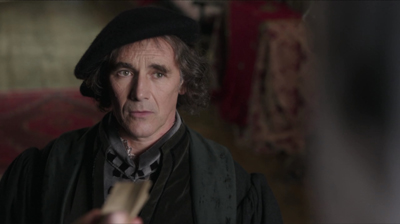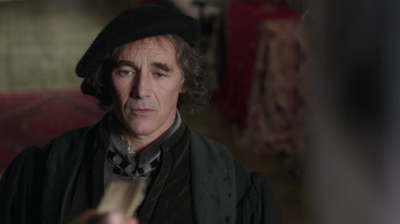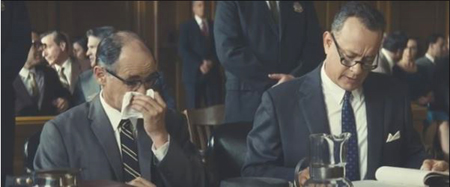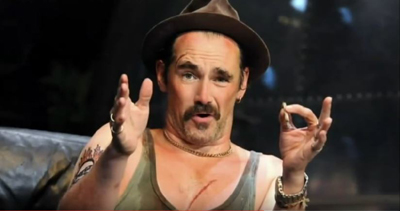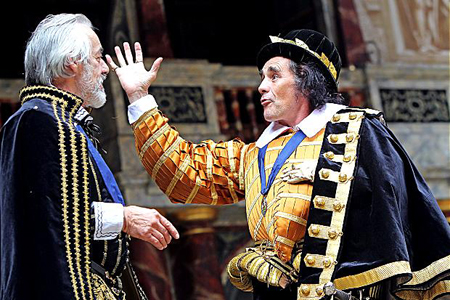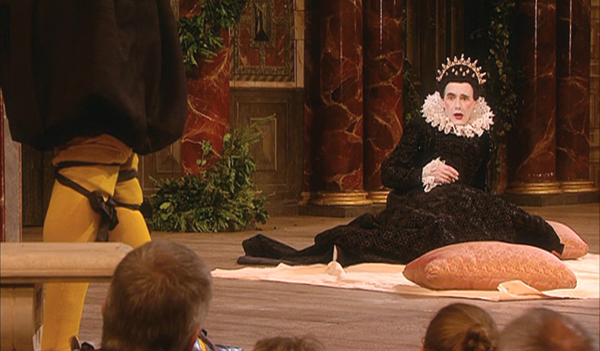Mark Rylance, man of mystery
Friday | October 30, 2015 open printable version
open printable version
Kristin here:
I asked Rylance, a most certain Best Supporting Actor nominee, if success would spoil him now. He had a good retort: “I thought I was successful already!” Indeed, he sure is. But Hollywood will embrace him.
Will it? Well, it can try. It should try.
SPOILERS for Bridge of Spies ahead.
Another great veteran actor who came out of “nowhere”
Upon reading the reviews of Steven Spielberg’s Bridge of Spies published over the past few weeks, many American moviegoers may have been puzzled by the fact that one of the most highly praised elements of the film was the supporting performance of Mark Rylance. Indeed, the praise was often unusually enthusiastic, with Rylance already considered a favorite for a supporting actor Oscar nomination or even win. I suspect that the vast majority of Americans have never heard of Mark Rylance, three-time Tony winner, two-time Olivier-award winner, Emmy nominee, etc. He fits the cliché of the “overnight success” who has been around for a long time and was, as he says, “successful already.”
In Bridge of Spies, Tom Hanks plays the lead, real-life lawyer James Donovan. In the late 1950s, Donovan accepted the unpopular job of defending a Russian spy, Rudolph Abel (played by Rylance), when he came to trial. Later he agreed to negotiate with the Soviet government to swap Abel for downed American pilot and spy Francis Gary Powers. Bridge of Spies is not one of Spielberg’s most exciting or endearing films, but it’s very well made and as classical in its traits as a film can be. It sits nicely beside his other historical dramas, Lincoln and the excellent Munich. On the whole the film has been well-reviewed, with a 92% favorable rating from all critics on Rotten Tomatoes, increasing to 98% among top critics. Rylance is clearly a major reason for the excitement.
It’s Rylance who keeps Bridge of Spies standing. He gives a teeny, witty, fabulously non-emotive performance, every line musical and slightly ironic — the irony being his forthright refusal to deceive in a world founded on lies. (David Edelstein)
Because this is Hanks we’re dealing with, audiences know what to expect, though the revelation here is Rylance (an actor Spielberg also cast as his forthcoming BFG), who appears utterly transformed — to the few who recognize his typically charismatic screen presence — into a balding, Eeyore-like gray moth of a man. (Peter Debruge; the reference is to Spielberg’s The BFG, with Rylance in the lead as the Big Friendly Giant, based on the Roald Dahl children’s novel and now in post-production)
Rylance, one of the greatest of contemporary stage actors, has to date had only an intermittent screen career, but Bridge of Spies suggests that could be about to change. He brings fascination and very, very subtle comic touches to a man who has made every effort to appear as bland, even invisible, as possible. (Todd McCarthy)
Brilliantly played by British theater legend Mark Rylance — who nearly steals the show. (Lou Lumenick)
Meanwhile, Rylance, who’s still probably best known for his brilliant work on stage, is the film’s real breakout discovery. With his musical Northern English accent and bemused, ironic demeanor, he turns a story that could feel as musty as a yellowed stack of old newspapers snap to exuberant life. (Chris Nashawaty)
Mark Rylance, the great English actor, director, and playwright who for a decade was the artistic director of Shakespeare’s Globe theater, performs some mysterious act of alchemy in his role as the ineffable and unflappable Soviet spy. Almost without speaking a word, he communicates this character’s rich inner life, in which a near-Buddhist resignation to the whims of fate alternates with a feisty instinct for self-preservation. (Dana Stevens)
Part of the reason why the Germany sequences sag is that they don’t feature Abel, who is played by British actor Mark Rylance in what, with luck, will be a career-making performance. Many viewers may not have heard of Rylance, who recently played Thomas Cromwell in “Wolf Hall” on PBS. But his work in “Bridge of Spies” deserves to be widely recognized as an example of screen acting at its most subtle, poignant and exquisitely calibrated. (Ann Hornaday, who, like Friedman, does not acknowledge that Rylance already had made quite a career for himself)
I could go on, but for more see the reviews by Manohla Dargis, Richard Roeper, Kenneth Turan, and Michael Phillips.
I don’t, in fact, think that the German sequences sag. Basically the first half of the film covers the trial and sentencing of Abel, with brief scenes of Powers’ training for his spying missions flying over Soviet territory. Once Powers is shot down, Donovan goes to East Berlin for the negotiations, leaving Abel behind in prison.
The German sequences involve a marvelously authentic post-war East Berlin, designed by Adam Stockhausen, who won an Oscar for the production design of The Grand Budapest Hotel. (I wasn’t there in the early 1960s, of course, but I did visit East Berlin in 1992, when part of the wall was still up and the place had a very Soviet look, complete with giant busts of Marx and Engels.)
No, these scenes don’t sag, but there is definitely a niggling question in the back of one’s mind: When are we going to see Abel again? Rylance somehow makes this very ordinary-looking, quiet man the heart of some of the film’s best scenes.
Treading the boards
As Rylance pointed out in the quotation at the top of this entry, he already had an illustrious career going long before Wolf Hall and Bridge of Spies hit American screens. (The Wikipedia entry on Rylance 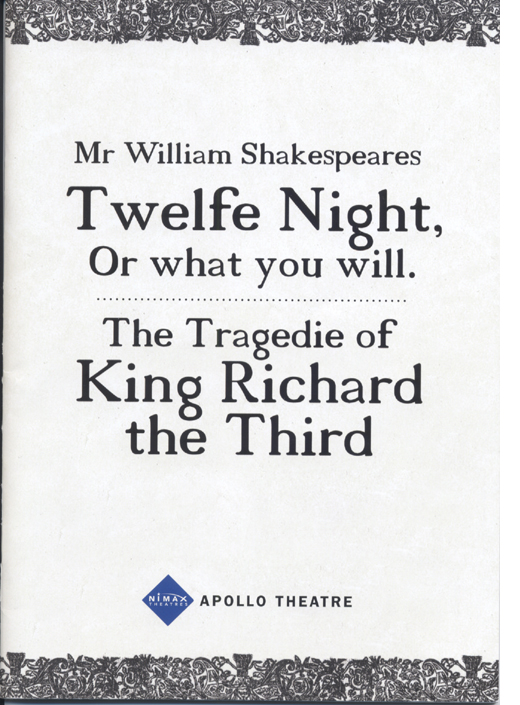 gives helpful biographical information as well as separate lists of his stage, film, and television performances and the nominations and awards resulting from each.) From 1995 to 2005, he was the first Artistic Director of the Globe Theatre, the replica of the original Elizabethan-period theatre in which many of Shakespeare’s plays premiered. He starred in a number of its Shakespeare productions, including some with authentic all-male casts and period costumes and staging.
gives helpful biographical information as well as separate lists of his stage, film, and television performances and the nominations and awards resulting from each.) From 1995 to 2005, he was the first Artistic Director of the Globe Theatre, the replica of the original Elizabethan-period theatre in which many of Shakespeare’s plays premiered. He starred in a number of its Shakespeare productions, including some with authentic all-male casts and period costumes and staging.
Rylance also won awards playing a variety of very different characters. In 1993 he won his first Olivier award (the top British acting honor) for playing Benedick in Much Ado about Nothing, and followed that up with a British Academy Television award for the TV film The Government Inspector (directed by Peter Kominsky, who later directed him in Wolf Hall, for which he was nominated for an Emmy). He did a comic star turn in a 2007 staging of Boeing-Boeing and was nominated for another Olivier; he won his first Tony when the production moved to Broadway. His second Olivier and second Tony came for his performance as Johnny Byron in Jerusalem, first in London and then on Broadway.
Perhaps Rylance’s greatest success, however, came with a pair of Shakespeare plays done in repertory, Twelfth Night, in which he played Olivia, and Richard III, with him in the title role. Rylance had played Olivia at the Globe in 2002, but from November, 2012 to February, 2013, both plays ran in alternation in the West End. Later they transferred to Broadway, where Rylance was nominated for a Tony as best actor as Richard III and won for best featured actor as Olivia. The plays were done as authentically as possible, with men playing all the roles and wearing costumes true to Shakespeare’s era.
Ben Brantley conveys some of the excitement of these productions and Rylance’s performances in his New York Times review:
In this imported production from Shakespeare’s Globe of London, deception is a source of radiant illumination for the audience, while the bewilderment of the characters onstage floods us with pure, tickling joy. I can’t remember being so ridiculously happy for the entirety of a Shakespeare performance since — let me think — August 2002.
That was the last time I saw the Globe’s “Twelfth Night” (in London), directed by Tim Carroll and starring the astonishing Mark Rylance, in a bar-raising performance as the Countess Olivia. And how thrilled I am that our wandering paths have crossed once more, rather like those of the separated twins at the play’s center.
This “Twelfth Night” — which opened on Sunday in repertory with a vibrant and shivery “Richard III” that allows Mr. Rylance to show he’s as brilliant in trousers as he is in a dress — makes you think, “This is how Shakespeare was meant to be done.”
Walter Kaiser makes similar remarks in The New York Review of Books (available to subscribers only; in print in the February 6, 2014 issue):
The production of Shakespeare’s Twelfth Night by the English theatrical company Shakespeare’s Globe, currently at the Belasco Theatre, brings this play to life in a way I have only very rarely seen equaled in a Shakespearean production. The performances are so uniformly skillful, the interpretation of the play so intelligent and imaginative, and the costumes and stage set so accurate and evocative that the entire experience is exhilarating. Audiences at the performances I’ve attended have been overcome with delight, clearly somewhat surprised by the affecting immediacy of the theatrical experience they have undergone, unaccustomed to a Shakespeare so readily comprehensible and so vividly alive. You may, if you’re lucky, see another Shakespearean production that’s as good as this one, but it’s unlikely you will ever see one that’s better. […]
Mark Rylance, who over the past decade or so has made the part his own, is undoubtedly one of the greatest Olivias of all time. Frequently, this part is played with a grave, graceful maturity that tends to mask, or at least minimize, the intensity of the emotional quandary Olivia finds herself in when, not wishing to receive any further expressions of love from Orsino, she discovers that she has fallen in love with the messenger who delivers them. Rylance, instead, beautifully exposes her perfervid confusion: overcome with emotion, he stammers (in confirmation of Viola’s observation that “she did speak in starts”), acts with impetuosity, and manifests, at times, an engaging exasperation with his inability to control his passion. His hands alone, in the informative subtlety of their gestures, betray the emotions Olivia wishes to conceal.
I was lucky enough to encounter this Twelfth Night, as well as Richard III, in late 2012 when I was in London for a few days. I’m partial to authentic performance styles in theatre and music, so the chance to see two Shakespeare productions with all-male casts was appealing. Little did I realize that I would be seeing two brilliant turns by an actor I had never seen before–or so I thought. In fact, he plays Ferdinand in Prospero’s Books, but nobody, especially in such a small, bland role, can get much attention when playing alongside John Gielgud as Prospero.
Spielberg discovered Rylance in the same way that I did. In a very informative article based on interviews with Rylance and Spielberg, Jack Cole reveals:
Spielberg was urged to see Rylance in “Twelfth Night” by Daniel Day-Lewis. He calls him “a shape-shifter, a man of a thousand faces and voices who can play any part.”
“Seldom has an actor been around for so many distinguished years on the stage and yet had not been fully discovered for the screen,” said Spielberg by email. “Mark understands that the camera records stillness better than in any other media. His transition from the stage to ‘Bridge of Spies’ was graceful and invisible.”
Cromwell and Abel and beyond
Those members of the American public who did know Rylance before Bridge of Spies had probably encountered him as Thomas Cromwell in the BBC series Wolf Hall, a Tudor-era costume drama which aired in six parts on PBS starting April 6, 2015. (David and I streamed it more recently, mainly to see Rylance.) It seems unfortunate that the two breakout roles that have brought the actor to such prominence this year both involve notably restrained performances.
Anthony Lane compared these performances in his New Yorker review of Bridge of Spies:
So what’s it all about? It’s not about the U-2 missions, and certainly not about Powers, who comes across as a lunk. Nor, despite the set pieces in court, is it about the majesty of the law. No, the core of this movie is a standoff every bit as keyed up, and as gripping, as anything on the muffled streets of Berlin. What we thrill to is Rylance versus Hanks: the British actor, lauded for his stage appearances, but barely known to cinema audiences, up against the consummate Hollywood pro. You can see them prowling, probing, and wondering what the next move will be—or, in Hanks’s case, wondering whether Rylance will move at all. Admirers of “Wolf Hall,” on PBS, will have noted him as Thomas Cromwell, standing like a statue in the shadows, and realized, to their discomfort, that they could not look away. He does the same thing here, as Abel; we watch him watching everybody else, as if life were an infinity of spies. “You don’t seem alarmed,” Donovan says when they first meet, and Abel replies with a gentle question: “Would it help?” The Coens turn that into a refrain that beats through the movie, growing wryer and funnier each time—right up to the fidgety finale, where Abel is the calmest man in sight.
Of course, Cromwell does move in Wolf Hall. He moves a lot. Few television series can have shown their protagonists walking from place to place so often and at such length. Rylance modeled his gait on that of a Hollywood star, according to the Cole piece cited above: “He’s explaining how Mitchum, whom he adores, inspired his steady, rigid gait in the international hit series ‘Wolf Hall.'”
More Rylance on Mitchum, from another interview:
I’ve watched lots of films preparing for this, and I was particularly struck by one of my favourite actors, Robert Mitchum, how his performances haven’t dated in the way that even perhaps more versatile actors, Brando and Dean and people of that era, have. I noticed how well he listens, how still he is, how present he seems. You’re drawn towards the screen – wondering what’s he thinking, what’s he going to do next. That’s always the best way to tell a story.
Kominsky describes adjusting his filming style for Wolf Hall to catch Rylance’s subtleties:
The one thing you might not be expecting is that he’s the most minute of film performers. Nothing is overblown. Nothing is writ too large. It’s very, very simple, very understated, his performance, and then you look into his eyes, and it’s all happening. Everything is going on in there, and of course, you’re drawn into closer and closer shots, just to try and capture the emotion that’s going on very slight below the surface, and that’s what I loved to film. (From George Pollen documentary, Sky’s Arts program, 19:00-19:47)
As David has pointed out, however, the eyes as such are not always particularly expressive. It’s the area of the face that contains the eyes that does the job. The eyebrows and forehead usually give the context that tells us what the eyes are expressing.
If we concentrate on the upper half of Rylance’s face, the considerable differences between his Cromwell and his Abel become apparent.
As Abel, he consistently does something rather remarkable: he raises his eyebrows, creating furrows in his forehead, without widening his eyes. That’s not an easy thing to do. The result is a perpetually curious or surprised expression, a sort of mask that Abel wears to suggest that he is naive, innocent, a little slow. In fact, as we discover whenever he speaks with Donovan, he’s well aware of everything going on around him and has considerable insight into it. But it’s the naivete that allows him to dupe the agents who search his hotel room into letting him clean the paint off his palette, thus allowing him to conceal a key bit of evidence.
The key moment during which Rylance drops this tactic happens during his “standing man” anecdote, about a man he knew who survived a severe beating by Soviet agents by simply getting up again each time he was struck to the ground; Donovan reminds him of that man, he says.
As Cromwell, Rylance’s main tactic using his face is to glance away at nothing in the course of a scene where he is conversing with someone or observing interactions among other characters. So much classical editing depends on our understanding of whom or what a character is looking at, but not here. In one scene, Ann Boleyn shows him a drawing she has found hidden in her bed, depicting her decapitated. She asks him to find out who put it there.
Apart from his eyes, Rylance remains uttlerly motionless through the shot in which she holds the drawing out to him. Initially he is looking at her face (that’s the side of her head out of focus in the foreground) and then glances down at the drawing as she holds it up from below the frame.
He then glances down briefly to a point just outside frame right–clearly not at Boleyn’s face or anything else relevant to the action.
He looks at her face again and finally at the drawing.
Nothing here betrays Cromwell’s emotions, since he is a man who has to keep his thoughts hidden from most of the people at court. But that extra shifting of the eyes momentarily to an inconsequential space shows us that he’s thinking. Maybe he has an idea as to who would have left the letter. Maybe he’s thinking of Ann’s sister’s warning to him in an earlier scene, telling him not to help Ann. We don’t know here, as we don’t in many other scenes where Rylance uses this same sort of eye movement.
Both Abel and Cromwell need to conceal their thoughts, but Abel does so through deception and Cromwell through concealment, both conveyed by subtle acting.
In the Pollen documentary, Rylance describes how he avoids putting too much into a performance (in this case referring to lecturing on stage acting to students):
If I was only allowed three words, I could distill all my complicated notes, and you can see how wordy I get if I get talking, to three words, which would be “You are enough.” What’s happening to you is you don’t feel you’re enough, and you’re putting more effort into it than you should. You’ll be in the center of yourself, your voice will be centered, your movements will be centered, and the audience will also believe you more, because they’ll also believe that you’re enough. (8:35-9:08)
In Bridge of Spies, the little gestures and bits of business that Rylance uses to draw our attention to Abel are minimal. He wipes his nose occasionally, apparently the victim of a persistent cold or allergy.
As Michael Phillips points out in his review, this cold creates a parallel to Donovan, who has his overcoat stolen in East Berlin and soon develops a cold of his own:
It’s brilliant, really. What’s the quickest way to establish the humanity of two leading characters in a Cold War drama? Give them both the sniffles. […]
Because he’s relatively new to multiplex audiences, Mark Rylance will likely walk off with the acting honors for “Bridge of Spies.” He looks nothing like the real Abel, but in a largely nonverbal, supremely poker-faced performance — even his stuffy nose is subtle — Rylance suggests a forlorn practitioner of deception who recognizes a lucky break when he sees it.
(Agent Hoffman has also caught a cold by the epilogue; an occupational hazard, apparently, and a subtle comic motif.)
There are other gestures: lengthy tapping of a cigarette on an ashtray and little sucking movements of the lips, suggesting ill-fitting dentures. (A bit more subtle scene-stealing than that practiced by Steve McQueen in The Magnificent Seven, as described by David.)
Yet Rylance is perfectly capable of comic, broad performances as well. His Olivier-and-Tony-winning turn in Jerusalem was as a raucous, drunken rascal.
He made Richard III a grotesquely deceitful clown.
His Olivia, though more restrained, can do a broad comic take, as when she first notices Malvolio sporting the detested cross-gartered yellow stockings (see bottom).
We can assume that his acting as the BFG will be miles away from his performance in Bridge of Spies.
Will Hollywood be able to embrace him?
Roger Friedman claims that Hollywood wants Rylance. Possibly, but Rylance is ambivalent about filmmaking and generally prefers the stage. Indeed, I wish I had a reason to be in London right now, since he is back in the theater, receiving more rave reviews as the depressed King Philippe in a limited run of Farinelli and the King, the much-praised first play by Rylance’s wife, Claire van Kampen.
The Cole piece sums up Rylance’s on-and-off relationship to film acting, which involves Rylance being willing to embrace it rather than it embracing him:
For Rylance, embracing movie acting has been a circuitous journey. As a young actor, he watched as his theater contemporaries — Daniel Day-Lewis, Gary Oldman, Kenneth Branagh — became famous on the big screen. Agents urged Rylance into TV and film so that he would be “a complete actor.”
“I just, time and again, was attracted by the theater where I was offered better opportunities,” says Rylance. “I auditioned for films and didn’t get them. I think I had some stuff to learn about film acting. I don’t think I was personally really ready for it. But I did come to resent it. I did eventually think: Why, why? You wouldn’t tell the great Tamasaburo or Ganjiro-san it’s not enough to be a Kabuki actor, you need to be a film actor.”
He rattles off some film experiences he’s enjoyed: the Quay brothers’ “Institute Benjamenta,” a A.S. Bryatt adaptation “Angels and Insects” and a handful of British TV films, like “The Government Inspector.”
“But I’ve made some bad films, too, that have not been enjoyable,” Rylance said on a recent New York afternoon on a day off from starring in van Kampen’s “Farinelli and the King” in London. “At a certain point after one of them I did a few years back, I said, ‘That’s it. I’m not interested in this anymore.’
“I thought: I need to be happy with who I am, where I am. That can be the kind of miners’ dust of being an actor,” he says. “For an actor, being dissatisfied with who you are can be the reason for becoming an actor, but it can become an illness.”
But once Rylance let go of being a movie star, film directors started calling.
“As I did that, wonderful film things started being offered to me,” he says. “Maybe that was partly the problem — that I was giving it too much forced value. Because I grew up in America, so I grew up with some theater. But mostly I saw three films a weekend in Milwaukee, Wisconsin.”
Yes, Rylance was a Wisconsin boy, in a sense. He was born in Kent in 1960, and his parents, both English teachers, moved to Connecticut in 1962 and then to Milwaukee in 1969. There his father taught at the University School of Milwaukee, where Rylance first studied acting. “He starred in most of the school’s plays,” as the Wikipedia entry cited above puts it. Returning to England, he studied at the Royal Academy of Dramatic Arts from 1978 to 1980. His time in the States suggests why his accent is not quite the normal English one that we expect from the great British actors. It is nice to think that Rylance was avidly attending films in Milwaukee during the same period when David and I were doing the same here in Madison.
Clips of some of Rylance’s stage roles are included in the George Pollen documentary linked above; others can be found by searching on YouTube. Fortunately the wondrous Twelfth Night was recorded and is available on DVD (here in the US and here in the UK). The rest of the cast is excellent, particularly Steven Fry as Malvolio and Paul Chahidi as Maria. The many cameras used in the filming capture the most salient action at every point and alternate details and long shots to give a sense of where the action is occurring. As the image below shows, it was filmed in the Globe, with the audience right up against the stage and quite obvious (in a good way) in many of the camera setups. In the scene below, a spectator gives a wolf-whistle as Malvolio struts about his his yellow stockings, which strikes me as a very groundling sort of thing to do. Having seen the performance from the front-row center of the balcony, I am glad to have a closer perspective.
[December 2: Rylance has won the New York Film Critics Circle award for Best Supporting Actor.]
[January 3, 2016: Rylance has won the National Society of Film Critics award for Best Supporting Actor.]
[February 15, 2016: Rylance has won the British Academy Film Award for Best Supporting Actor.]
[February 28, 2016: Rylance has won the Academy Award for Best Supporting Actor. The story linked to here considered this an upset, as Sylvester Stallone had been widely predicted to win. But as I’ve shown here, a lot of us back in October knew better.]
[February 29, 2016: Rylance has been nominated for an Olivier Award for Farinelli and the King.]
[March 6, 2016: Pete Hammond of Deadline Hollywood has pointed out that Rylance won his Oscar without ever having participated in a single campaign event in the awards season. (He was given a day off from his current stage show in Brooklyn, Nice Fish, to go to Los Angeles to attend the Oscars ceremony.)]
[December 31, 2016: The Queen’s New Year’s Honours for 2017 include a knighthood for Rylance.]












